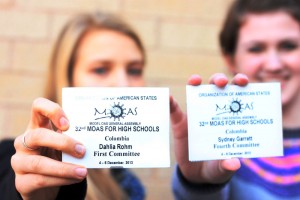
by Annie Zhang, news editor
After a successful state competition last spring, juniors Sydney Garrett and Dahlia Rohm advanced to the national convention held in Washington, D.C. on Dec. 4-6.
Both Rohm and Garrett began Model OAS (short for the Organization of American States) this year, and Rohm was elected vice chair of her committee for next year.
“It’s fun to debate people, and some people say some pretty interesting things,” Garrett said. “It’s nice to debate with them about it, and point out what they’re saying is not the smartest thing.”
The OAS itself is an organization similar in purpose to the United Nations. It consists of all the North and South American countries except Cuba and Honduras, but has no governing power. Rather, it comes up with ideas to improve human rights situations, drug trafficking situations or politics and economics.
“We model a committee meeting that would go on in the OAS, so we debate resolutions that propose solutions to certain problems,” Rohm said.
Each debater is required to write a resolution, in which they propose solutions to certain problems.
“The resolutions are also cool to write, because they’re the most ridiculous and uppity things ever,” Garrett said. “They have so many subparts, you have to reference different documents, and it’s kind of ridiculous.”
Competitors are required to speak a lot, especially when their own resolution is being debated. The way they speak, what they say and how many times they speak all affect how the judges score them, and then the top 6 people advance to the next level.
“I was forced to speak a lot, and it was a two-day competition. I had talked on the phone with my friend who introduced me to it the night before, and she told me that I needed to speak more and propose amendments to the resolutions,” Rohm said. “I thought I was speaking enough, and I had spoken on half of the resolutions, but she said it still wasn’t enough. So, I kind of just said anything that came to my mind, and it worked.”
Rohm said that by doing so, Model OSA helped build her confidence. Garrett also said that it has helped her on impromptu speaking.
“The debate style is a lot of just standing up and giving a speech right away and sounding intelligent, so having a lot of practice was helpful,” Garrett said.
The national convention, however, was not as Rohm and Garrett had imagined.
“I do want to do it next year–not necessarily as a delegate but rather as vice chair because there wasn’t much competition for me as a delegate, so I and a few others were the only ones debating,” Rohm said. “The overall caliber of the convention was rather disappointing. And our entire delegation shared that view, I’m sure.”
Garrett also said that it was “just a bunch of prep school kids winning everything,” and that she wouldn’t want to go to the national convention again.
Though at the national level, Model OAS was a letdown, it also introduced Rohm and Garrett to a variety of topics and helped them become more aware of the issues happening around them.
“It was cool to talk about the issues as if we were actually going to propose solutions to economic developments and human rights issues,” Rohm said. “It was interesting to be exposed to different ideas and topics, such as the rights of people with disabilities in America.”

